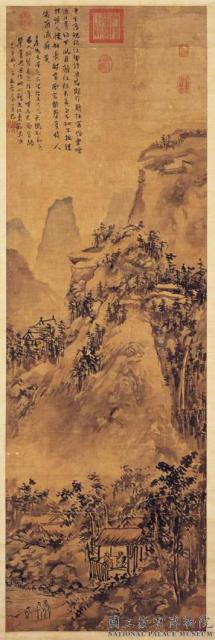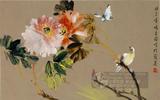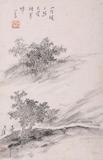明史端木仿黃公望山水 軸
推薦分享
資源連結
連結到原始資料 (您即將開啟新視窗離開本站)後設資料
- 資料識別:
- 故畫002344N000000000
- 資料類型:
- 類型:繪畫
- 型式:靜態圖像
- 著作者:
- 史端木
- 主題與關鍵字:
- 瀑布 房舍 傢俱(屏風) 茅草屋 高士(士人、隱士) 溪澗、湍泉 侍從(侍女、童僕) 寺廟
- 出版者:
- 數位化執行單位:國立故宮博物院
- 日期:
- 明孝宗弘治十七年(1504)
- 格式:
- 本幅 142.7x46.1公分、全幅 67公分
- 關聯:
- 石渠寶笈初編(御書房),下冊,頁1146&*故宮書畫錄(卷八),第四冊,頁89&*故宮書畫圖錄,第六冊,頁341-342&* 史忠(西元一四三八年生),本姓徐,名端本,字廷直。十七歲方能言,外呆內慧,人以癡呼之,因號癡翁,又稱癡仙,又號癡癡道人,金陵(今南京)人。善畫,似方從義,長於雲山圖,瀟酒不群。其山水樹石,縱筆揮寫,不拘家數。兼善人物、花木、竹石,亦有奇趣。 起首畫山石茅舍,為林木環掩,後石壁聳立,其上林木、懸泉、寺宇錯落其間。此圖用筆灑脫,淡墨淋漓,極高遠之致。其中點景人物和林木畫法似受沈周影響。 &* Shih Chung was originally named Hsü Tuan-pen. His style name was T’ing-chih. He couldn’t speak until he was seventeen years old. Although he appeared to be mentally deficient, he was in fact quite intelligent. Therefore, he chose the sobriquets Ch’ih-weng (Dotard), Ch’ih-hsien (Fool). Ch’ih-ch’ih tao-jen (Stupid-stupid-taoist). He was a native of Chin-ling (modern Nanking). He specialized in paintings in the style of Fang Ts’ung-i and also in painting of cloud-encircled mountains. His paintings are elegant and of a superior quality. His landscapes were executed in an unrestrained manner. He also painted figures, flowers and birds, and strange rocks in an original manner. This painting depicts a thatched cottage and rocks surrounded by trees. The mountain in the background towers over the scene, and is itself covered with trees, waterfalls, and temples. Elegant brushwork and light ink contribute to the overall refinement of this work. The style of the figures and trees show the influence of the Ming dynasty painter Shen Chou. &*1.〈明史忠仿黃公望山水〉,收入陳階晉、賴毓芝主編,《追索浙派》(臺北:國立故宮博物院,2008年初版一刷),頁183。 2.邱士華,〈明史端木仿黃公望山水〉,收入何傳馨主編,《山水合璧:黃公望與富春山居圖特展》(臺北:國立故宮博物院,2011年五月初版一刷),頁335-336。 &*史忠(1438-?)本姓徐,名端木,號癡翁,金陵人。善畫山水,縱筆揮灑,有行雲流水之趣。此軸作於1504年,是史忠贈予知己楊天德的作品。前景畫溪畔茅屋數間,其後山巖聳峙,林巒間深藏宮觀,並有瀑布直瀉而下。此圖以淋漓淡墨營造濕潤山氣,雖不著意於仔細描繪山林間各式物像,卻成功營造出雲霧蒸騰之際,山景的幻變莫測,類似〈富春山居圖〉以率逸的淡墨長皴,描繪山巒林木源源不絕的生意。(20110609)&*Shi Zhong (original name Xu, name Duanmu, sobriquet Chiweng), a native of Jinling, was good at landscape painting and excelled at brushwork free and easy like floating clouds and flowing water. This hanging scroll from 1504 is a work presented by Shi Zhong (Duanmu) to his close friend Yang Tiande. The foreground depicts some thatched houses by the bank of a stream. Behind are precipitous mountains with a Taoist temple tucked away among the forested peaks as a cascade falls on the other side. The extremely moist shades of ink create a lush and humid mountain scene. Although less attention was paid to the various motifs in the mountains and forests, it still successfully creates an evanescent scene of clouds and mist in which the illusory depths are difficult to fathom. The long texture strokes in light ink are similar to the free and direct form of expression in “Dwelling in the Fuchun Mountains,” describing the unending vitality of mountains and forests.(20110609)
- 管理權:
- 國立故宮博物院
授權聯絡窗口
- 國立故宮博物院圖像授權、出版授權、影音資料授權-申請流程說明
http://www.npm.gov.tw/zh-TW/Article.aspx?sNo=03003061






